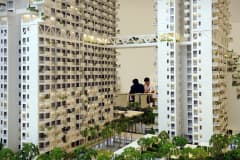Property Launches & Investments
This is some blog description about this site
Singapore Takes Further Steps to Cool Housing Market
- Font size: Larger Smaller
- Hits: 1367
- 0 Comments
- Subscribe to this entry
- Bookmark
Singapore has been trying to keep a lid on property prices due to low interest rates caused by quantitative easing adopted by Western central banks.
The flush liquidity could reverse in coming months, however, amid signs that the U.S. Federal Reserve is preparing to slow down its bond buying program.
"The MAS is probably worried that in the environment of low-interest rates, people are overly gearing themselves up to pay for property," said Kenneth Ng, head of CIMB Research in Singapore.
Singapore's 10-year bond yield has risen by more than a percentage point since the start of the year to around 2.5 percent currently, from around 1.3 percent at the end of 2012, following the upward trend in U.S. yields.
But mortgage rates, which in the AAA-rated city-state are tied to short-term interest rates, have only edged up slightly, with the three-month interbank rate little changed from the start of the year at around 0.4 percent.
Barclays, in a recent report, said Singapore property prices were vulnerable to a sharp rate increase after three years of super-low interest rates when private home prices rose by around 60 percent.
Should mortgage rates rise by 200 basis points within a short period, private residential prices in the city-state could fall by up to a quarter, it said.
Singapore has rules regulating the maximum amount of money banks can lend based on the value of the property.
The new requirements, which tie the loan quantum to income levels, will make it harder for property buyers to avoid additional stamp duty on purchases of second homes since they cannot use a family member's name for subsequent purchases.
| Mortgages |
|

